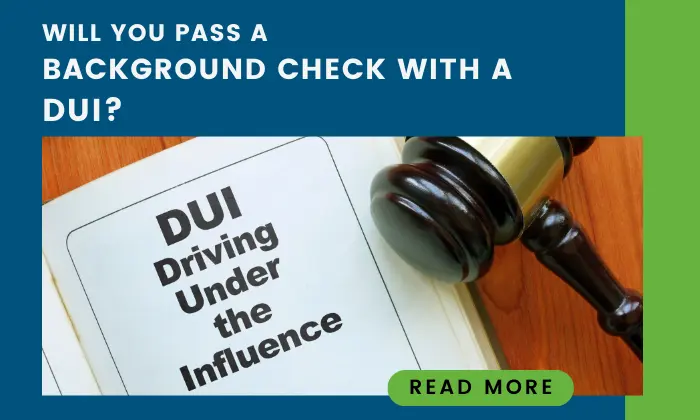Background checks have become a common practice in today’s world, especially for employment, housing, and volunteer opportunities. These comprehensive screenings aim to provide insight into an individual’s past and help organizations make informed decisions. One question that often arises in the minds of those who have a DUI (Driving Under the Influence) conviction is whether it will affect their chances of passing a background check. A DUI conviction can indeed have implications, but the outcome depends on various factors. Understanding DUI background checks can help individuals navigate the process and make informed decisions about their future endeavors.
Understanding Background Checks
Background checks have become a crucial part of the screening process for employers, organizations, and even landlords. These checks provide valuable information about an individual’s past, helping to assess their suitability for a particular role or opportunity. While the exact components of a background check can vary, they typically involve several common elements.
Firstly, a background check may include a criminal record search, which aims to uncover any previous convictions or pending criminal charges. This is where a DUI (Driving Under the Influence) offense can come into play, as it is typically considered a criminal offense.
Additionally, background checks may involve a verification of employment history, education credentials, and professional licenses. These checks help confirm the accuracy of the information provided by the individual and ensure that they possess the required qualifications for a given position.
Another common component is a review of an individual’s credit history. This is often relevant for roles involving financial responsibilities or positions of trust, as it provides insight into an individual’s financial stability and responsible behavior.
Furthermore, background checks may include checks on an individual’s driving records, which can reveal any traffic violations, including DUI convictions. This is particularly significant for roles that involve driving or operating vehicles as part of the job responsibilities.
It’s important to note that background checks are conducted to mitigate risks and make informed decisions, but the specific components can vary depending on the nature of the opportunity and the legal requirements of the jurisdiction.
You may also like to read “Do all jobs do in-depth background checks?“
Impact of DUI on Background Checks
A DUI (Driving Under the Influence) conviction can have implications when it comes to passing a background check. The severity and recency of the offense, as well as the specific requirements of the position or opportunity being pursued, can influence the impact of a DUI on the overall results of the background check.
One of the key factors that determine the impact of a DUI is the severity of the offense. If the DUI resulted in a misdemeanor or felony conviction, it may carry more weight during the background check process. Felony convictions, in particular, can have more significant consequences and may raise concerns for employers or organizations.
The recency of the offense also plays a role. Generally, more recent DUI convictions are likely to be viewed as more relevant and potentially impactful. Employers and organizations may be more concerned about recent DUI convictions, as they may raise questions about an individual’s judgment, reliability, and potential risk in the present.
Additionally, the industry and specific requirements of the position being pursued can impact the significance of a DUI conviction in a background check. Certain industries, such as transportation or jobs involving the care of vulnerable populations, may have stricter guidelines and regulations when it comes to DUI convictions. In these cases, a DUI offense may have a more substantial impact on the background check results, potentially disqualifying an individual from consideration.
It’s important to note that jurisdictional differences can also influence how a DUI conviction is treated during the background check process. Laws and regulations regarding the disclosure of criminal records, including DUI convictions, can vary from one jurisdiction to another. Understanding the specific legal requirements in the relevant jurisdiction is crucial for individuals seeking to navigate background checks with a DUI conviction.
Types of Background Checks
There are various types of background checks that are commonly conducted by employers, organizations, and landlords. These include:
- Employment Background Checks: These checks focus on an individual’s employment history, verifying past positions, job responsibilities, and performance. They may also include criminal record searches, credit checks, and verification of educational credentials.
- Volunteer Background Checks: Organizations that involve volunteers often conduct background checks to ensure the safety and security of their programs. These checks may include criminal record searches and reference checks.
- Housing or Rental Application Background Checks: Landlords and property management companies often perform background checks on prospective tenants. These checks may involve criminal record searches, credit history reviews, and eviction records.
- Professional License Background Checks: Certain professions require individuals to hold specific licenses or certifications. Background checks in these cases focus on verifying the validity and authenticity of the licenses held by the individual.
- Personal Background Checks: Individuals can also conduct personal background checks on themselves for various reasons, such as understanding what information may come up during official checks or for personal safety reasons.
Strategies to Improve Background Check Results
When facing a background check, especially with a DUI conviction, there are several strategies individuals can employ to improve their results:
- Rehabilitation and Legal Steps: Taking steps to address the DUI conviction, such as completing required rehabilitation programs, fulfilling legal obligations, and demonstrating a commitment to personal growth and responsibility.
- Disclosure: Being transparent about the DUI conviction during the application process, if required, and providing context or an explanation of the circumstances surrounding the offense. Honest disclosure can demonstrate accountability and a proactive approach.
- Emphasizing Personal Growth: Highlighting the lessons learned from the DUI conviction, such as changes in behavior, attitudes, and responsible decision-making. Showing how the experience has contributed to personal growth and positive changes can help mitigate concerns.
- Character References and Letters of Recommendation: Obtaining references from individuals who can vouch for personal character, work ethic, and reliability. These references can provide a positive perspective on an individual’s suitability for a position or opportunity.
Legal Considerations and Rights
When it comes to background checks and DUI convictions, there are important legal considerations and rights that individuals should be aware of. These considerations can vary depending on the jurisdiction and the specific laws in place. Here are some key points to keep in mind:
- Laws and Regulations: Familiarize yourself with the laws and regulations in your jurisdiction regarding the disclosure and consideration of criminal records, including DUI convictions. Understanding the specific requirements can help you navigate the background check process effectively.
- Disclosure Requirements: Some jurisdictions may require individuals to disclose their DUI conviction during the application process for certain positions or opportunities. It’s essential to understand whether there are legal obligations to disclose such information and the specific time frames within which disclosures must be made.
- Anti-Discrimination Laws: In many jurisdictions, there are laws that protect individuals from discrimination based on their criminal records, including DUI convictions. These laws aim to ensure fair treatment and equal opportunities for individuals with past convictions, allowing them a chance to reintegrate into society.
- Rehabilitation and Expungement: In some cases, individuals may have the option to pursue rehabilitation programs or legal procedures to mitigate the impact of a DUI conviction on their background check results. Expungement of record sealing may be available in certain jurisdictions, which can help individuals limit the visibility of their DUI conviction in background checks.
- Access to Records: Individuals typically have the right to access and review their own criminal records, including any information related to DUI convictions. This allows individuals to verify the accuracy of the records and address any discrepancies if necessary.
It is crucial to consult with legal professionals who specialize in criminal law or employment law to understand the specific legal considerations and rights relevant to your situation.
Rehabilitation and Moving Forward
After a DUI conviction, it is important to focus on rehabilitation and moving forward in a positive direction. Here are some steps individuals can take to facilitate personal growth and demonstrate their commitment to a better future:
- Completion of Required Programs: Fulfill any court-mandated programs, such as alcohol education or substance abuse counseling. These programs are designed to help individuals address the underlying issues that may have contributed to the DUI offense.
- Continued Support and Counseling: Seek ongoing support through counseling or support groups to maintain sobriety, address any underlying issues, and develop healthy coping mechanisms. Professional guidance can be instrumental in sustaining personal growth and maintaining a positive trajectory.
- Responsible Decision-Making: Make a conscious effort to prioritize responsible decision-making, especially regarding alcohol consumption and driving. Demonstrating a commitment to making wise choices can showcase personal growth and responsibility.
- Community Involvement: Engage in community service or volunteer work to give back and contribute positively to society. This demonstrates a commitment to making amends and becoming a valuable member of the community.
- Personal Development: Invest in personal development by acquiring new skills, pursuing education or certifications, or engaging in activities that promote self-improvement. This showcases a dedication to personal growth and continuous learning.
- Positive Character References: Build strong relationships with individuals who can vouch for personal character and provide positive references. These references can help showcase personal growth and vouch for an individual’s integrity and reliability.
Moving forward after a DUI conviction requires dedication, self-reflection, and a commitment to positive change. By taking proactive steps toward rehabilitation and personal growth, individuals can demonstrate their determination to move beyond their past mistakes and make a positive contribution to their own lives and the community at large.
Conclusion
Passing a background check with a DUI conviction can present challenges, but it is not an insurmountable obstacle. Understanding the impact of a DUI on background checks, as well as the strategies to improve results, empowers individuals to navigate this process effectively. By taking steps towards rehabilitation, being transparent, emphasizing personal growth, and seeking positive references, individuals can present themselves in the best possible light. It is important to remember that legal considerations and rights also play a significant role, and individuals should consult with legal professionals to ensure they are aware of their specific jurisdiction’s laws. Moving forward after a DUI conviction requires dedication, self-reflection, and a commitment to personal growth. By doing so, individuals can strive for a brighter future and open doors to new opportunities.







